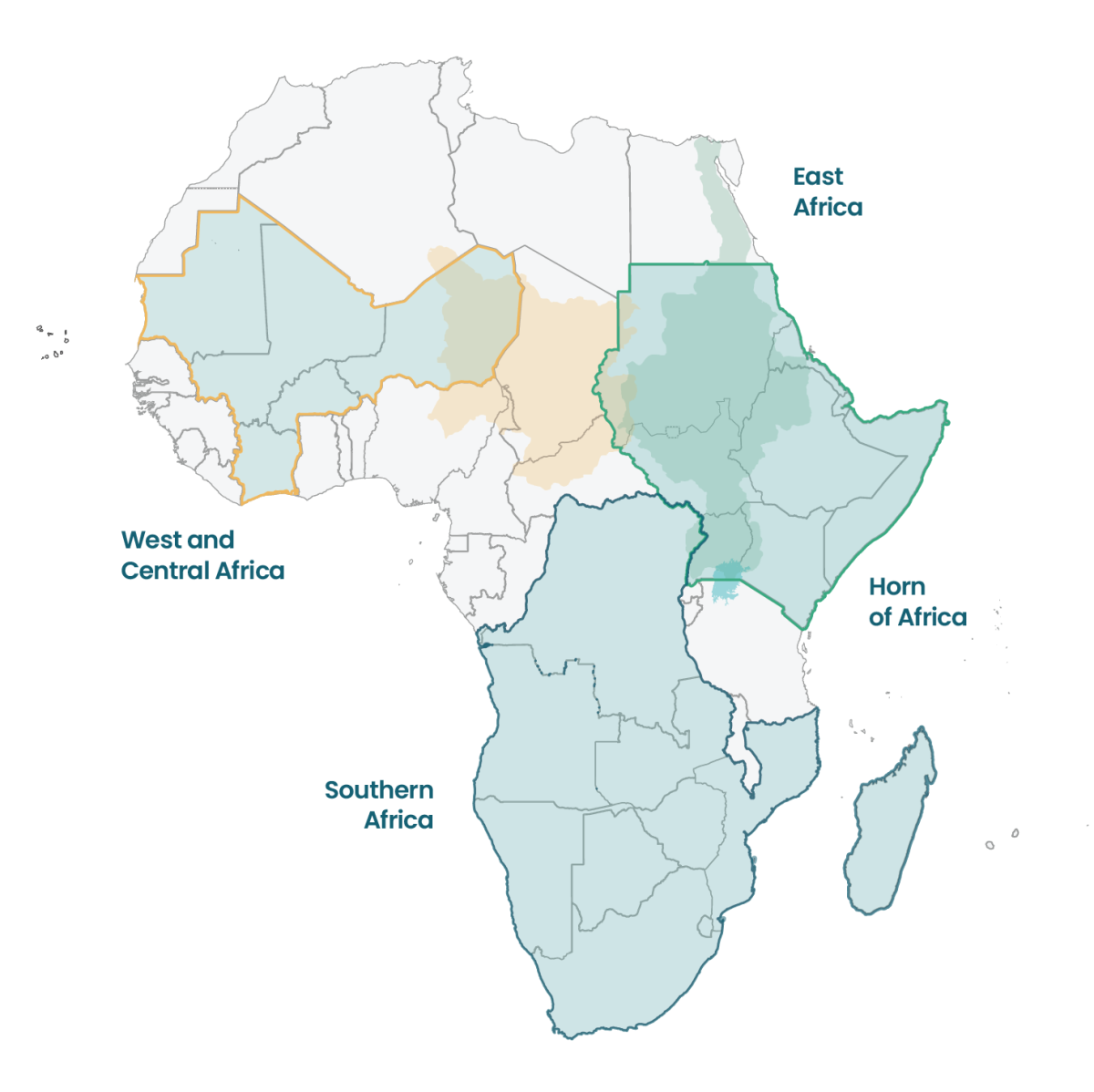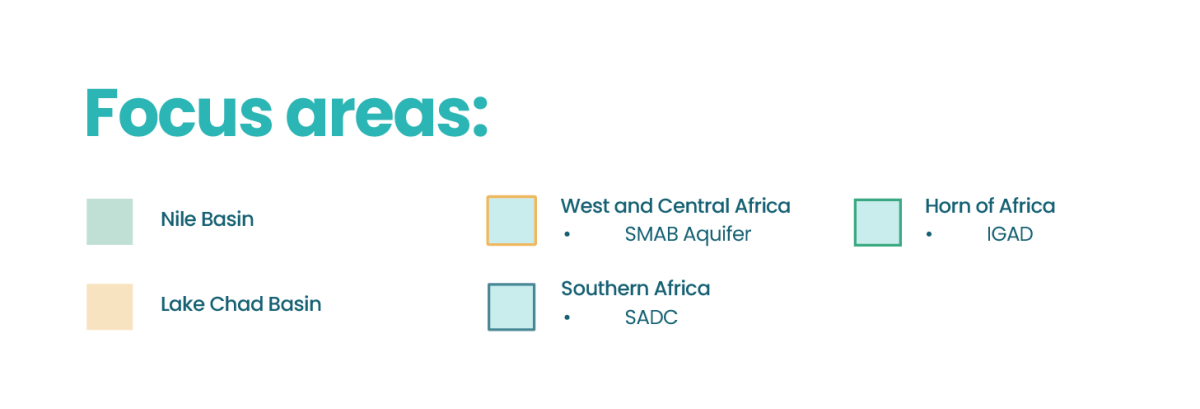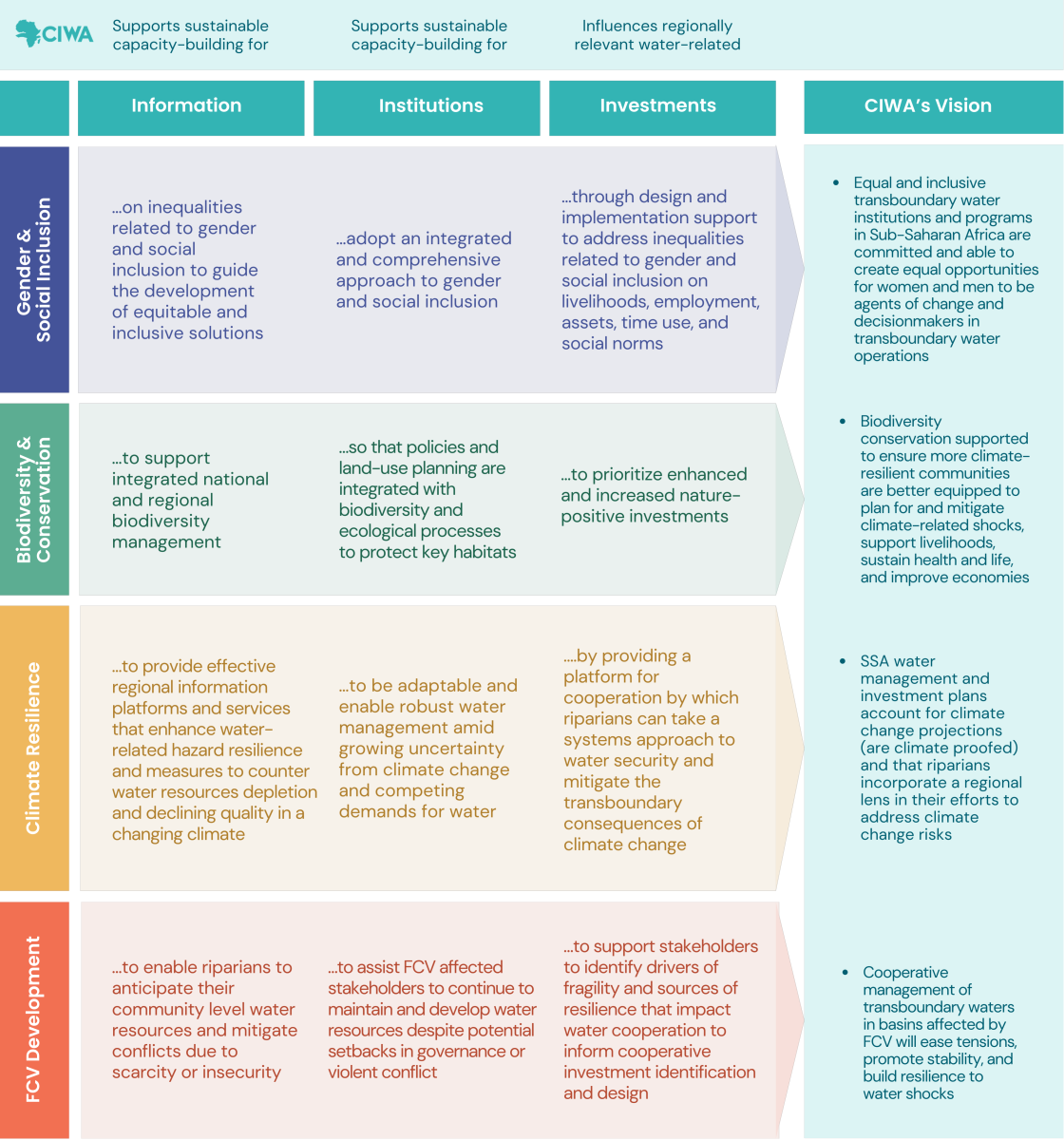CIWA Program: Going Beyond Water
Transforming Challenges into Opportunities
The World Bank’s Cooperation in International Waters in Africa program—CIWA—is at the forefront of tackling Sub-Saharan Africa’s most urgent water-related challenges and transforming them into opportunities for resilience and growth. Challenges include:
- Water insecurity
- Climate change impacts including biodiversity loss
- Poverty, fragility, and cross-border tensions
- Gender inequality
A Unique Force for Collaboration
Since 2011, CIWA has catalyzed change by accelerating transboundary water cooperation in Sub-Saharan Africa to enable governments, river basin organizations, civil society groups, and others to make evidence-based decisions about water resources management and development. CIWA is:
- The only organization solely dedicated to this critical mission
- A key player in realizing the World Bank’s vision for a sustainable, resilient, and inclusive Africa
- A program with a proven track record of inspiring countries to work together for their mutual benefit
Our Impact
CIWA’s work aligns with the World Bank’s mission to end extreme poverty and boost shared prosperity on a livable planet. CIWA consistently gets results by working across three pillars—information, institutions, and investments.
CIWA has catalyzed:
- $17.4 billion in investments (both mobilized and potential) to manage watersheds, develop groundwater, build storage, and more.
- 85.9 million people have benefited from mobilized investments or likely will benefit from potential investments influenced by CIWA.
Initiatives and Programs: A Regional Approach
West and Central Africa
West and Central Africa faces increasing climate change impacts, including prolonged drought and unpredictable rainy seasons. The Sahel also suffers from fragility, violence, weak institutions, and political instability. In a region with widespread gender inequality, CIWA is working to ensure the equitable participation of women in decision making about water resources. It also is improving water security by addressing knowledge and capacity gaps, identifying investments and policy actions, and emphasizing the sustainable management and development of groundwater.
Lake Chad Water Security – this initiative assesses the current state of water security and transboundary cooperation in the Lake Chad Basin at the political (vision), institutional (roles), and technical (investments) levels. It is divided into two pillars: Pillar A focuses on building the analytical and institutional foundation for water security and informs the identification and design of activities under Pillar B to catalyze future investments. Know more.
Improving Water Resources Management in West and Central Sahel: the initiative aims to improve water resources management by identifying pragmatic investments and policy actions, as well as addressing critical knowledge and capacity gaps. Know more.
East Africa
East Africa faces numerous challenges, including food and water insecurity, growing violence and conflict, and climate change impacts. CIWA, which grew out of the progress made by the Nile Basin Trust Fund in water resources management and development in that basin, continues to enhance the region’s resilience to climate change and water insecurity through advancing water disaster mitigation and early warning systems.
The Nile Cooperation for Climate Resilience (NCCR) supports regional coordination on dam safety policies and flood early-warning systems in the Nile Basin. Know more.
Eastern and Southern Africa Regional Climate Resilience Program: NCCR also leveraged additional IDA funding for ENTRO and NELSAP-CU via this new Program so they can work closely with South Sudan in addressing the transboundary dimension of the floods. Know more.
Horn of Africa
The Horn of Africa is facing cascading impacts from the worst drought in four decades, which CIWA is working to ameliorate. CIWA also is improving access to groundwater through nature-based infrastructure as the region’s cornerstone of water security. It is expanding the knowledge base on groundwater, strengthening the capacity of partners to manage and develop this valuable resource, working to understand the influences of water insecurity on FCV situations, and improving regional initiatives to build resilience.
Untapping Resilience in the Horn of Africa (HoA) strengthens regional cooperation and capacities in groundwater development and management and expanding the knowledge base on groundwater resources. Know more.
South Sudan Transboundary Waters Support Program – To complement the World Bank’s Regional Climate Resilience Program (RCRP) for Eastern and Southern Africa, which aims to increase resilience to water-related climate shocks, CIWA launched the Strengthening Transboundary River Basin Organizations through Program Development and Capacity Building in Africa and the South Sudan Transboundary Waters Support Program. The latter will include large-scale analytics and advisory support to deepen the dialogue on climate risk and water resource management in refugee hosting areas and define targeted interventions to maximize climate resilience at multiple scales. Know more.
Southern Africa
Prolonged drought conditions in Southern Africa are fueling food and water insecurity, poverty, and economic fragility. CIWA is addressing the region’s significant challenges managing its increasingly important groundwater resources. It is building resilience to drought by addressing cross-border drought risks, improving management of shared waters, and facilitating cooperation around sustainable management of transboundary aquifers and river basins.
The Southern African Development Community Groundwater Institute’s (SADC-GMI’s) Phase Two project: building on the dynamic Phase One project, this project provides the SADC-GMI strategic guidance on how to manage water and food security impacts, boost livelihoods, and adapt to climate change. Know more.
Support to Regional Climate Resilience in Eastern and Southern Africa: strengthening Transboundary Basin Organizations through Program Development and Capacity Building in Africa, is supporting the World Bank’s implementation of the Regional Climate Resilience Program for Eastern and Southern Africa. RCRP is a regional IDA-funded multiphase programmatic approach that promotes a bottom-up and demand-driven strategy for regional cooperation and aims to increase resilience to regional water-related climate shocks. Phase 1 includes Comoros, Madagascar, Mozambique, South Sudan, the NBI, and SADC;36 Phase 2 includes Malawi and the African Union. Know more.


Cross-cutting engagements and Pillars of the program
The escalating pressure on transboundary waters across the African continent is driven by factors such as climate change, population growth, conflicts, client demands, strategic priorities, and improved methodologies addressing cross-cutting themes. These themes include biodiversity, climate resilience, gender and social inclusion (GESI), and fragility, conflict, and violence (FCV). These elements serve as crucial pathways for achieving results in the areas of investments, information, and institutions, collectively referred to as the CIWA’s three Is. In response to these challenges, CIWA has developed an updated 2.0 Theory of Change and Results Framework (image below) that focuses on these essential cross-cutting themes.



